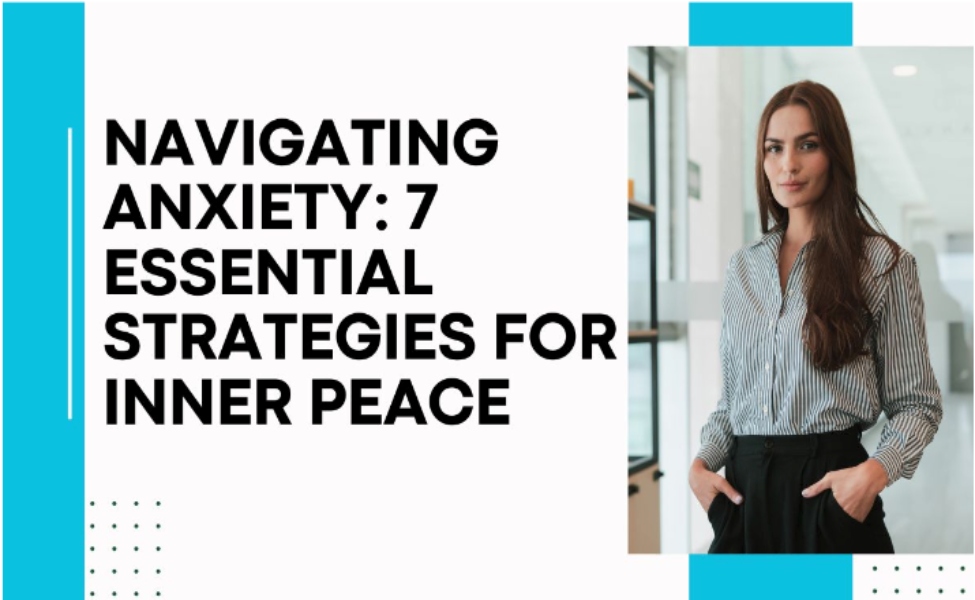
Navigating Anxiety: 7 Essential Strategies for Inner Peace
Anxiety is a natural part of life, but when it becomes overwhelming, it can take a toll on our mental and emotional well-being. Whether it’s juggling work responsibilities, managing relationships, or coping with life’s uncertainties, finding effective ways to manage anxiety is crucial for women’s mental health. In this blog post, we’ll provide seven practical strategies to help women alleviate its grip and find inner calm.
Practice Deep Breathing:
Deep breathing exercises are a simple yet powerful way to calm the mind and body. When anxiety strikes, take a moment to focus on your breath. Inhale deeply through your nose, allowing your lungs to fill with air, and exhale slowly through your mouth. Repeat this several times, focusing on the sensation of your breath filling your body. Deep breathing activates the body’s relaxation response, helping to reduce anxiety levels and promote a sense of calm.
Engage in Regular Physical Activity:
Physical activity is a natural stress reliever and mood booster. Regular exercise releases endorphins, the body’s feel-good chemicals, and helps to reduce levels of stress hormones. Whether it’s going for a walk, practising yoga, or dancing around your living room, find an activity that brings you joy and make it a regular part of your routine. Aim for at least 30 minutes of moderate exercise most days of the week to reap the full benefits for your mental and physical well-being.
Embrace Mindfulness and Meditation:
Mindfulness and meditation are powerful practices for cultivating present-moment awareness and reducing anxiety. Take time each day to sit quietly and focus on your breath, allowing your thoughts and feelings to come and go without judgement. You can also try guided meditation apps or mindfulness exercises that help you stay grounded in the present moment. With regular
practice, mindfulness and meditation can help you develop a greater sense of calm and resilience in the face of anxiety.
Establish Healthy Habits:
Taking care of your overall well-being is essential for managing anxiety. Ensure you prioritise self-care activities that nourish your body, mind, and spirit. Get enough sleep each night, eat a balanced diet rich in fruits, vegetables, and whole grains, and limit your intake of caffeine and alcohol, which can exacerbate anxiety symptoms. Make time for activities that bring you joy and relaxation, whether it’s reading a book, taking a bath, or spending time outdoors in nature.
Seek Support from Others:
Remember that you don’t have to navigate anxiety alone. Reach out to trusted friends, family members, or seek professional help if needed. Talking about your feelings and concerns with others can provide comfort and support, and offer valuable perspectives on managing anxiety. Consider joining a support group or seeking therapy to learn additional coping strategies and tools tailored to your specific needs.
Set Worry Time:
Allocate specific time during the day to address worries and concerns. This helps prevent constant rumination and allows you to focus on finding solutions during designated periods, rather than letting worries consume your entire day. You may find that you don’t need to use your worry time all the time.
Use the ‘Right Now’ Skill:
When feeling overwhelmed, use the ‘Right Now’ skill to ground yourself in the present moment. Take a moment to notice and name five things you can see, four things you can touch, three things you can hear, two things you can smell, and one thing you can taste. This technique helps shift your focus away from anxious thoughts and brings you back to the present, reducing distress and promoting calm.
While anxiety may be a part of life, it doesn’t have to control your well-being. By implementing these seven strategies – practising deep breathing, engaging in regular physical activity, embracing mindfulness and meditation, establishing healthy habits, seeking support from others, setting worry time, and using the ‘Right Now’ skill – you can reduce anxiety and cultivate a greater sense of calm and resilience. Remember, it’s important to be patient and kind to yourself as you navigate your journey toward finding inner peace and well-being.
Also, consider joining our Decider 32 Skills course to learn more strategies and tools for effectively managing anxiety and promoting mental well-being. You can find more information about the course here: https://positivewellbeinghk.com/proactive-mental-health/32-skills-course/
Blog written by Positive Wellbeing Limited

